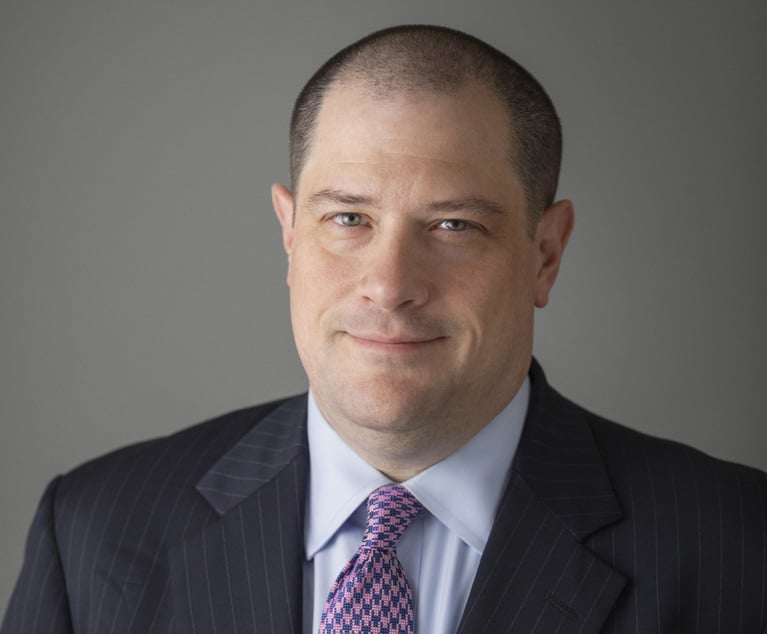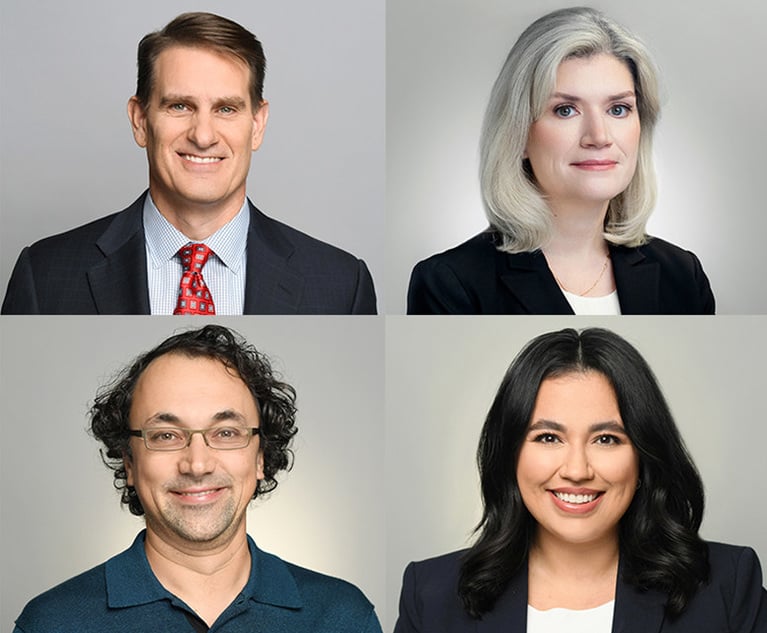 Laura Albinson protesting in favor of the Senate hearing witnesses during the Impeachment trial against President Donald Trump, in Washington, D.C., on Jan. 16, 2020.
Laura Albinson protesting in favor of the Senate hearing witnesses during the Impeachment trial against President Donald Trump, in Washington, D.C., on Jan. 16, 2020.'Criminal-like' Charges and Evidence Abound in Impeachment Proceedings
There has been much talk in the Senate trial to the effect that no crimes or crime-like behavior have been charged or proven. To the contrary, the articles of impeachment sound a lot like an indictment on several federal crimes, backed up by a lot of testimony at trial.
February 04, 2020 at 12:14 PM
7 minute read
The Republicans' defense of the president has focused, in part, on the argument that neither the articles of impeachment nor the evidence presented at the trial has shown any crimes, or, in the words of Harvard Law professor Alan Dershowitz, any "criminal-like conduct." I am no constitutional scholar and cannot speak to the appropriate standards, but as a former federal prosecutor and longtime criminal defense lawyer, I can look at a charging document and a set of facts and see the federal criminal charges implicated. Leveraging this experience, and from what I've seen thus far in the trial, any prosecutor worth his or her salt could make a clear case that the president and others engaged in illegal activities, including conspiracy, bribery and obstruction of Congress.
The Illegal Conspiracy to Violate Election Laws
Conspiracy, of course, is a distinct federal crime designed to address the evils of joint action toward criminal ends, whether or not those ends are achieved. Prosecutors love to charge conspiracies because the law allows a wealth of evidence to be admitted under the co-conspirator exception to the hearsay rule and because it doesn't take much to become a member of a conspiracy. All it takes is for the conspirators to have agreed on the essential nature of a plan with a criminal objective—not necessarily on the details of their criminal scheme—and for one member of the conspiracy to have committed an overt act. It would not take much to convert the lengthy narrative established in the House testimony into a conspiracy indictment.
The illegal objects of the conspiracy, first and foremost, would be a violation of the criminal provisions of the Federal Election Campaign Act, which make it unlawful for a person to solicit election contributions, including "any thing of value," from the government of a foreign country. The Federal Election Commission has long interpreted "anything of value" broadly. Getting Ukraine to announce an investigation of the Bidens was plainly of value to the president, given the extreme efforts he and others went to try to obtain it. Many people have gone to prison for lesser election law violations.
Article I of the articles of impeachment says pretty much the same thing: "Using the powers of his high office, President Trump solicited the interference of a foreign government, Ukraine, in the 2020 United States Presidential election. He did so through a scheme or course of conduct that included soliciting the Government of Ukraine to publicly announce investigations that would benefit his reelection." Sure, the title of the article is "Abuse of Power," and it doesn't have all the bells and whistles and boilerplate of a federal conspiracy indictment, but the accusation is clear.
The Accusation and Evidence of Bribery
Many prosecutors would also be inclined, on the facts revealed in the House investigation, to charge a conspiracy to solicit bribery, or the stand-alone crime of soliciting a bribe. The standard jury instruction for the federal bribery statute requires merely that the defendant demanded or sought something of value, while a public official, with the corrupt intent to be influenced in the performance of an official act. Conditioning a White House meeting or the release of hundreds of millions of dollars in military aid on opening an investigation into a political rival would seem to qualify. There would be a fight over the president's "corrupt" intent, of course, but many prosecutors would welcome the chance to prove the president's intent by disproving the administration's shifting explanations—a classic prosecutor's strategy at trial.
What does Article I of the articles of impeachment say? "With the same corrupt motives, President Trump—acting both directly and through his agents within and outside the United States Government—conditioned two official acts on the public announcements that he had requested," that is, the $391 million in military aid to Ukraine and the White House meeting. Pretty close to what a federal bribery indictment would say. Again, no statutory cites and boilerplate recitation of the elements of the offense, but interestingly that kind of verbiage was not in the articles of impeachment against either Presidents Richard Nixon or Bill Clinton.
Obstruction of Congress
Article II of the articles of impeachment is devoted entirely to obstruction of Congress, laying out the president's directions to the White House, executive branch agencies and several enumerated individuals not to produce documents or testify. Similarly, much of the Nixon impeachment articles approved by the House were directed at Nixon's failure to comply with subpoenas. Here, the evidence has shown that the administration has stonewalled far more extensively than Nixon, including blanket directives to witnesses not to testify.
Prosecutors typically throw the criminal statute book at defendants who get in the way of an investigation or trial, so calling these accusations criminal or "criminal-like" is not a stretch. Indeed, telling witnesses not to cooperate with an investigation is usually the third rail for defendants, and even worse are overt threats—here there is ample evidence that both have happened. The fact that they happened in public is no defense. The federal witness tampering statute, 18 U.S.C. § 1512, is extremely broad and easy to charge, encompassing tampering by violence, threats, intimidation, harassment, persuasion, deception, or the destruction of evidence. The federal obstruction of proceedings statute, 18 U.S.C. § 1505, makes it a crime to use a "threatening letter or communication" to obstruct or impede a congressional investigation.
While the president's defenders have pointed to alleged privileges and immunities to excuse compliance, there has been extensive testimony that those arguments don't exist, don't apply, have been waived or are frivolous. It strains the imagination to think that these arguments would justify a stonewall as extensive as that erected by the president.
There has been much talk in the Senate trial to the effect that no crimes or crimelike behavior have been charged or proven. To the contrary, the articles of impeachment sound a lot like an indictment on several federal crimes, backed up by a lot of testimony at trial.
These are just a few of the most obvious criminal theories that come to mind. Many more are plausible. It is beyond the scope of this article to discuss the constitutional issues, but if one is focused on the conduct that is alleged in the articles and that has emerged at the trial, it is hard to say that it is not at least "criminal-like."
Stuart Gasner, who was a partner at the firm for over 20 years, is of counsel at Keker, Van Nest & Peters, focusing his practice in the areas of white-collar criminal and securities defense, intellectual property litigation and complex corporate disputes. A former federal prosecutor, he has tried more than 25 cases to verdict before juries across the United States. Nicholas Green, an associate at the firm, contributed research support to this article.
This content has been archived. It is available through our partners, LexisNexis® and Bloomberg Law.
To view this content, please continue to their sites.
Not a Lexis Subscriber?
Subscribe Now
Not a Bloomberg Law Subscriber?
Subscribe Now
NOT FOR REPRINT
© 2024 ALM Global, LLC, All Rights Reserved. Request academic re-use from www.copyright.com. All other uses, submit a request to [email protected]. For more information visit Asset & Logo Licensing.
You Might Like
View All
Protecting Attorney-Client Privilege in the Modern Age of Communications
6 minute read

Lingering Questions at Supreme Court About Climate Change Litigation Need Resolution
6 minute read
Law Firms Mentioned
Trending Stories
- 1Judge Denies Sean Combs Third Bail Bid, Citing Community Safety
- 2Republican FTC Commissioner: 'The Time for Rulemaking by the Biden-Harris FTC Is Over'
- 3NY Appellate Panel Cites Student's Disciplinary History While Sending Negligence Claim Against School District to Trial
- 4A Meta DIG and Its Nvidia Implications
- 5Deception or Coercion? California Supreme Court Grants Review in Jailhouse Confession Case
Who Got The Work
Michael G. Bongiorno, Andrew Scott Dulberg and Elizabeth E. Driscoll from Wilmer Cutler Pickering Hale and Dorr have stepped in to represent Symbotic Inc., an A.I.-enabled technology platform that focuses on increasing supply chain efficiency, and other defendants in a pending shareholder derivative lawsuit. The case, filed Oct. 2 in Massachusetts District Court by the Brown Law Firm on behalf of Stephen Austen, accuses certain officers and directors of misleading investors in regard to Symbotic's potential for margin growth by failing to disclose that the company was not equipped to timely deploy its systems or manage expenses through project delays. The case, assigned to U.S. District Judge Nathaniel M. Gorton, is 1:24-cv-12522, Austen v. Cohen et al.
Who Got The Work
Edmund Polubinski and Marie Killmond of Davis Polk & Wardwell have entered appearances for data platform software development company MongoDB and other defendants in a pending shareholder derivative lawsuit. The action, filed Oct. 7 in New York Southern District Court by the Brown Law Firm, accuses the company's directors and/or officers of falsely expressing confidence in the company’s restructuring of its sales incentive plan and downplaying the severity of decreases in its upfront commitments. The case is 1:24-cv-07594, Roy v. Ittycheria et al.
Who Got The Work
Amy O. Bruchs and Kurt F. Ellison of Michael Best & Friedrich have entered appearances for Epic Systems Corp. in a pending employment discrimination lawsuit. The suit was filed Sept. 7 in Wisconsin Western District Court by Levine Eisberner LLC and Siri & Glimstad on behalf of a project manager who claims that he was wrongfully terminated after applying for a religious exemption to the defendant's COVID-19 vaccine mandate. The case, assigned to U.S. Magistrate Judge Anita Marie Boor, is 3:24-cv-00630, Secker, Nathan v. Epic Systems Corporation.
Who Got The Work
David X. Sullivan, Thomas J. Finn and Gregory A. Hall from McCarter & English have entered appearances for Sunrun Installation Services in a pending civil rights lawsuit. The complaint was filed Sept. 4 in Connecticut District Court by attorney Robert M. Berke on behalf of former employee George Edward Steins, who was arrested and charged with employing an unregistered home improvement salesperson. The complaint alleges that had Sunrun informed the Connecticut Department of Consumer Protection that the plaintiff's employment had ended in 2017 and that he no longer held Sunrun's home improvement contractor license, he would not have been hit with charges, which were dismissed in May 2024. The case, assigned to U.S. District Judge Jeffrey A. Meyer, is 3:24-cv-01423, Steins v. Sunrun, Inc. et al.
Who Got The Work
Greenberg Traurig shareholder Joshua L. Raskin has entered an appearance for boohoo.com UK Ltd. in a pending patent infringement lawsuit. The suit, filed Sept. 3 in Texas Eastern District Court by Rozier Hardt McDonough on behalf of Alto Dynamics, asserts five patents related to an online shopping platform. The case, assigned to U.S. District Judge Rodney Gilstrap, is 2:24-cv-00719, Alto Dynamics, LLC v. boohoo.com UK Limited.
Featured Firms
Law Offices of Gary Martin Hays & Associates, P.C.
(470) 294-1674
Law Offices of Mark E. Salomone
(857) 444-6468
Smith & Hassler
(713) 739-1250









